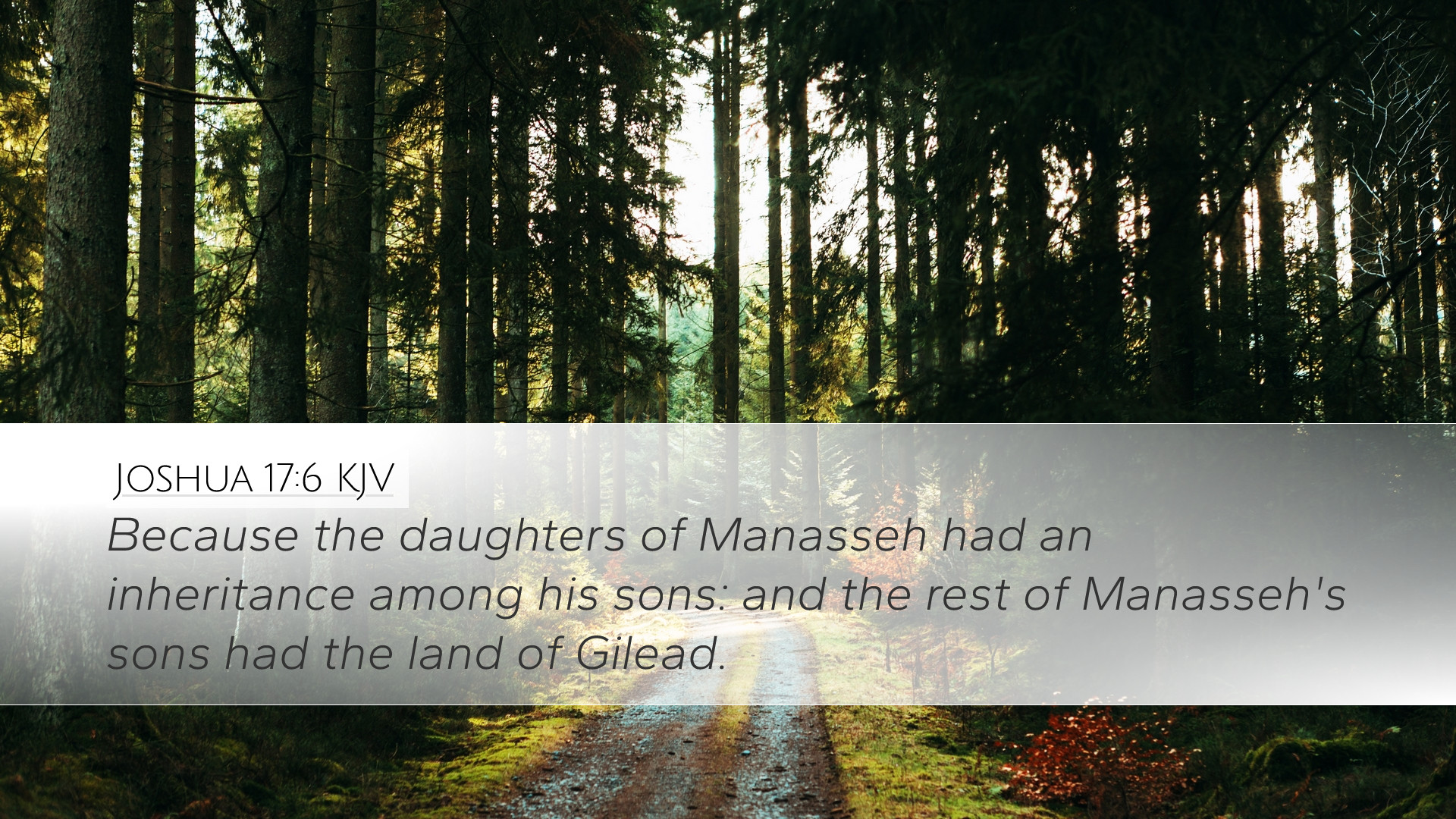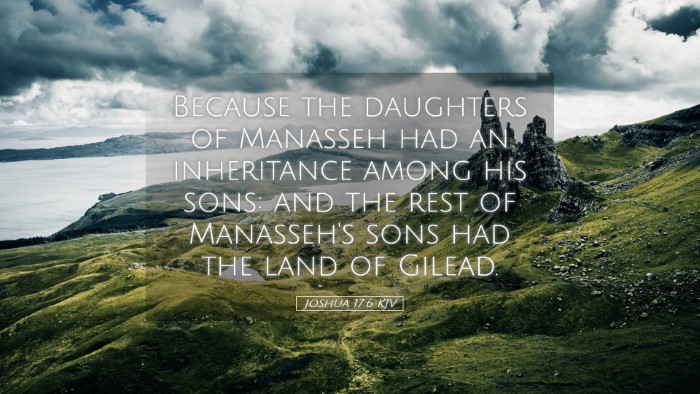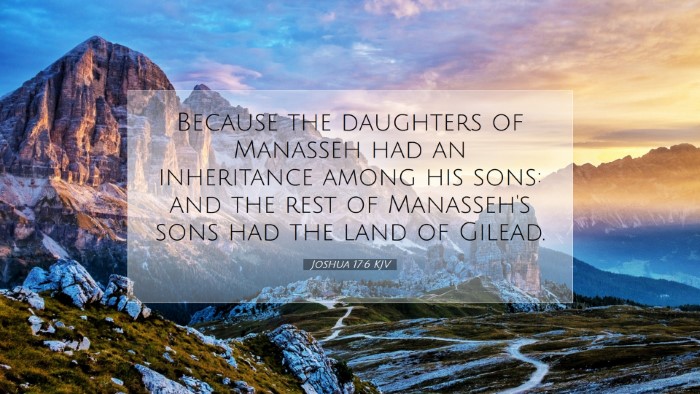Old Testament
Genesis Exodus Leviticus Numbers Deuteronomy Joshua Judges Ruth 1 Samuel 2 Samuel 1 Kings 2 Kings 1 Chronicles 2 Chronicles Ezra Nehemiah Esther Job Psalms Proverbs Ecclesiastes Song of Solomon Isaiah Jeremiah Lamentations Ezekiel Daniel Hosea Joel Amos Obadiah Jonah Micah Nahum Habakkuk Zephaniah Haggai Zechariah MalachiJoshua 17:6
Joshua 17:6 KJV
Because the daughters of Manasseh had an inheritance among his sons: and the rest of Manasseh's sons had the land of Gilead.
Joshua 17:6 Bible Commentary
Commentary on Joshua 17:6
Text of Joshua 17:6 (KJV): "For the daughters of Manasseh have received an inheritance among his sons: for the rest of Manasseh's sons, the coast of Manasseh was from Asher to Michmethah, that lieth before Shechem."
Introduction
The passage in Joshua 17:6 signifies an important moment in the allocation of land among the tribes of Israel, a theme underlined by questions of inheritance, identity, and gender roles within the biblical community. The mention of the daughters of Manasseh not only highlights a unique occurrence in the ancient patriarchal society but also invites deeper exploration into God's justice and the complexities of familial relationships. This commentary draws insights from classic biblical commentators and networks them into a cohesive reflection for pastors, students, theologians, and scholars.
The Significance of the Daughters’ Inheritance
Matthew Henry notes that the daughters of Manasseh receiving an inheritance marks a significant deviation from traditional customs regarding inheritance. This decision is rooted in the daughters' plea, as reiterated in Numbers 27, showcasing God's procedural fairness and adaptability to the circumstances of the people.
- God’s Justice: This act illustrates God's commitment to justice and righteousness, enabling the daughters to inherit alongside their brothers, thereby reinforcing their value within the community.
- Cultural Context: The cultural significance of this event reveals a shift in societal norms, suggesting that divine provisions cater to evolving human situations.
The Allocation of Land
Albert Barnes emphasizes the description of the land that was inherited by the tribes as indicative of their geographical and strategic importance. The coastal regions of Manasseh possess both natural resources and vital routes for trade and defense.
- Geographical Overview: The territory stretching from Asher to Michmethah encapsulates a mix of fertile areas and mountainous regions, fundamentally impacting the socio-economic conditions of the tribes.
- Strategic Positioning: The strategic proximity to Shechem and other important cities signifies a calculated blessing from God, providing opportunities for growth and influence within the Promised Land.
Understanding Manasseh’s Sons
Adam Clarke interprets the mention of "the rest of Manasseh's sons" as reflective of the broader narrative concerning inheritance. There is a distinction made regarding the distribution of land to not only the male descendants but also their sisters, illustrating equality and divine providence.
- Equality Among Siblings: The acknowledgment of females in the inheritance structure challenges the patriarchal norms of the time and underscores a more inclusive community.
- Legacy of Manasseh: The sons are reminded of their heritage and the spiritual legacy bestowed upon them, which is underscored by their geographic inheritance.
Theological Reflections
Within this seemingly straightforward allocation of land lies profound theological implications. The inheritance represents more than just physical land; it signifies spiritual identity, belonging, and the covenant relationship between God and His people.
- Covenant Relationship: Each family’s land signifies their place in God’s covenant as a selected tribe with responsibilities toward God and His commandments.
- Faith and Heritage: The act of receiving inheritance expands on the notion of faith communities, emphasizing that every believer—male or female—holds a rightful place in God's promises.
Contemporary Implications
The message from Joshua 17:6 transcends time, calling modern audiences to consider issues of justice, equality, and the treatment of women in religious settings. It prompts questions regarding gender roles, the authoritative voice of women, and how these aspects are integrated into faith communities today.
- Empowerment: The passage encourages the empowerment of women in church leadership, guiding communities towards a more equitable structure.
- Inclusion in Ministry: The inheritance is a reminder that all people, regardless of gender, should be incorporated into the ministry and recognized for their contributions and rightful place among God's chosen.
Conclusion
Joshua 17:6 serves as a powerful testament to God’s unwavering justice and the inclusion of all His people within the framework of His divine plan. By examining the insights from respected commentators, we gain a richer understanding of the text and its implications for faith communities today. It is a call to remember that inheritance—both physical and spiritual—is treasured among all, emphasizing the collective identity and responsibility of believers as part of God's covenant community.


